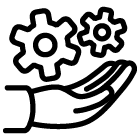Resource Crosswalk
The resources presented in this Crosswalk lend support to districts, schools, and classrooms in the continuous improvement process.
Explore the Crosswalk by selecting the content areas on the left navigation below and then select the resources appearing to the right to learn more.
Evidence Based Practices and Supports
The following resources provide evidence-based strategies to support teams with effective and efficient approaches.
| Description | Type | Length | Certificate |
|---|---|---|---|
Educational Service Guidelines for the Students who are Deaf and Hard of HearingA guidance document for deaf education in Ohio that focuses on how to identify, assess, plan, provide, and monitor educational services and programs. Key concepts are essential building blocks that support evidence-based predictors for post-school success. |
 |
 |
|
Effective Practices: Supporting Youth In School, In the Community and On the Job and Predictors of Post School SuccessEffective Practices and Predictors are research-based strategies that focus on supporting transition age youth to gain critical skills and experiences. The Practices and Predictors are useful to transition professionals in school and agencies across systems and in multiple environments. |
 |
 |
|
Empowering Expert Learners yields Successful Post-secondary OutcomesDiscover how the UDL Expert Learner builds successful lifelong learning and improves the likelihood of on-time graduation and successful post-secondary outcomes. This will be accomplished through discussion, and a role play involving a building leadership team. |
 |
 |
|
The MedEd Connections Resource Guide: Blind or Visually ImpairedThe MedEd Connections Resource Guide: Blind or Visually Impaired is designed to support families as they manage, access, and share medical and educational information concerning their children. The purpose of this guide is to help families build their understanding and connect important medical and educational information to make more informed decisions, so that their children who are blind or visually impaired (B/VI) can grow and live their best lives. |
 |
 |
|
Ohio Guidelines for Working with Students who are Blind or Visually ImpairedThe purpose Ohio Guidelines for Working with Students who are Blind or Visually Impaired is to provide guidance for decision-making for educators and families. Learners who are blind or visually impaired have a wide range of abilities, as well as needs. To support them in the general education curriculum, educators, and families must be knowledgeable of services required and resources available. |
 |
 |
|
On-Demand Training Professional DevelopmentThe Outreach Center for Deafness and Blindness at OCALI supports districts through on-demand group training to meet identified needs for supporting students who are deaf, hard of hearing, blind and visually impaired |
 |
 |
|
Take 5 VideosLearn about essential topics for transition and adulthood and engage in new ideas through Take 5 webcasts. Each short video in the Take 5 series will review a topic, concept or idea about transition and adult life planning, service, and support for those assisting youth and adults with disabilities. Take 5 also provides five take-away resources for each of the webcasts to help extend learning and support implementation of new knowledge or sharing of valuable ideas. |
 |
 |
|
Technical Assistance/ConsultationThe Outreach Center for Deafness and Blindness assists families and educators with individualized information and training for students who are deaf, hard of hearing, blind and visually impaired. |
 |
 |
|
What Works for Work training seriesOCALI set out to introduce selected evidence-based practices and how to incorporate these into the academic, vocational and social education and preparation for transition youth. The project, commonly known as What Works for Work, resulted in user-friendly tools and resources now available on this website. |
 |
 |
 |
Yes We Can: Journey Towards IndependenceIn the Yes We Can: Journey Towards Independence participants join Michelle and her guide dog, Tonne, for a new, interactive video series designed to share how she lives an independent, quality life as a person who is Deafblind. Each 30-minute episode will include pre-recorded segments, followed by a live dialogue with Michelle, who is eager to share her experiences and connect with viewers. Tying all of these episodes together is the connection to the Expanded Core Curriculum (ECC), which includes foundational skills essential for people with disabilities. |
 |
 |
 |